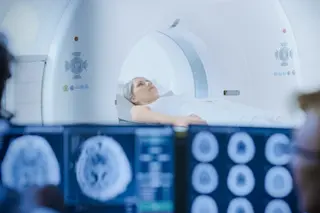One day in high school, Elyn Saks was walking home when she realized that the houses lining the street were sending her messages. “Look closely,” they said, “You are special… especially bad.” During her freshman year at Vanderbilt University, she began to wonder if showers were really necessary; and by her first year in graduate school, she was hospitalized after she became convinced that she was on the verge of killing hundreds of thousands of people with her thoughts.
This is schizophrenia, as recounted in Saks’s memoir, The Center Cannot Hold. A genetically influenced disease, schizophrenia presents itself differently in everyone it attacks, but it is invariably terrifying, and often totally debilitating. Unlike depression, it offers little hope of resolution. And unlike bipolar disorder, which brings periods of euphoria, it appears to have no discernible upside. Which is why scientists find the disease so mystifying. One of the key tenets ...













